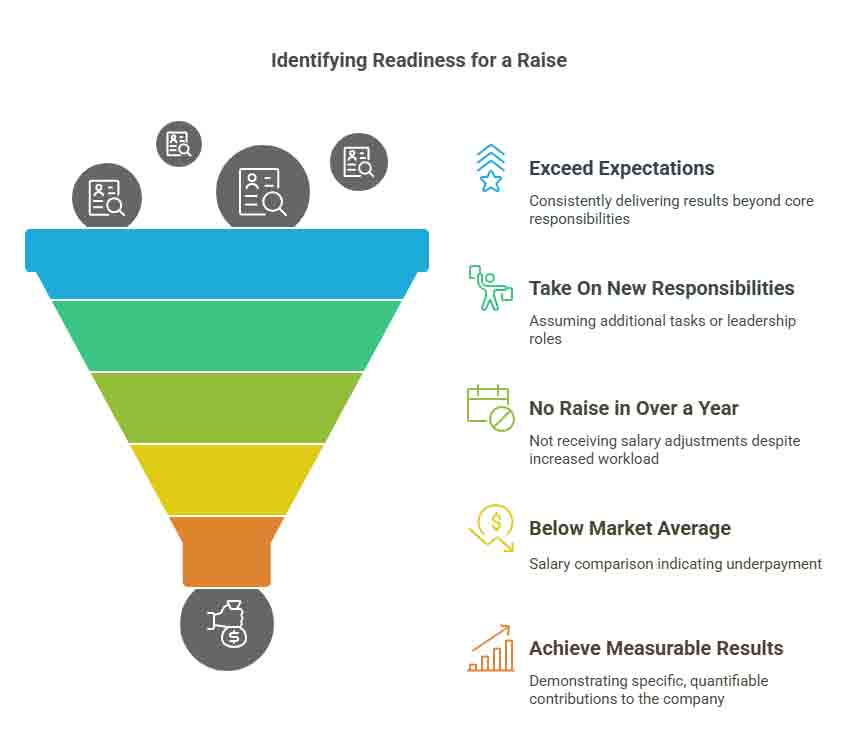Asking for a raise is one of the most common career concerns—especially during a performance review. While it may seem like the right time to bring it up, many employees feel uncertain about how to approach the conversation without risking their reputation or damaging their relationship with their manager. This hesitation often leads to missed opportunities, even when their performance clearly justifies a salary increase.
A performance review is a structured meeting designed to evaluate progress, contributions, and future potential. If approached with preparation and professionalism, it can also be the ideal moment to open the conversation about compensation. However, knowing what to say—and how to say it—can make the difference between a confident, productive discussion and an awkward or ineffective one.
I. Is It Okay to Ask for a Raise During a Performance Review?
Yes, asking for a raise during a performance review is not only acceptable—it’s often the most strategic time to bring up the topic. Performance reviews are typically scheduled to assess your contributions, highlight your progress, and discuss your future within the company. Since these meetings are already focused on your performance and growth, they provide a natural opportunity to talk about compensation in a structured and professional setting.
Managers generally expect discussions around career development during reviews, and compensation is a key part of that. If you’ve met or exceeded expectations, taken on additional responsibilities, or contributed significantly to your team or department, it is reasonable to discuss whether your current salary reflects that value.
However, timing and context matter. It’s important to evaluate whether your company is in a stable financial position and whether your performance aligns with the standards expected for a salary increase.
II. Signs You’re Ready to Ask for a Raise
Knowing when to ask for a raise is crucial. While many professionals hesitate, certain clear signs indicate you’re in a strong position to start the conversation during your performance review.
1. You’ve Consistently Exceeded Expectations
If your recent work has gone beyond your core responsibilities and your results have contributed directly to team or business goals, that’s a strong indicator. Positive performance reviews and regular recognition from your manager are signals that your value is being noticed.
2. You’ve Taken On New Responsibilities
If your role has expanded significantly but your compensation has not been adjusted, it may be time to initiate a raise discussion. Taking on more complex tasks or stepping into leadership roles often justifies a salary increase.
3. You Haven’t Received a Raise in Over a Year
If your salary has remained the same for a long period despite increased performance, workload, or changing market standards, you may be underpaid based on current benchmarks and responsibilities.
4. Your Salary Is Below Market Average
Using data from reliable salary research tools can help you assess whether your current pay aligns with industry standards. If it falls short, and your performance supports it, a raise request is justified.
5. You’ve Achieved Measurable Results
Whether you’ve improved efficiency, increased revenue, reduced costs, or delivered high-impact projects, being able to point to specific outcomes shows you’re contributing in ways that support business goals.
Identifying these signs and having evidence to support them can give you the clarity and confidence to ask for a raise at the right time.

Also Read: 7 Personality Traits That Make You a Valuable Employee
III. How to Prepare Before the Review
Effective preparation is essential when planning to ask for a raise during your performance review. Going into the meeting with clear data, structured reasoning, and confidence will help you present your case professionally and increase your chances of success.
1. Review Your Recent Performance
Start by gathering a list of your key achievements since your last review. Focus on specific goals you’ve met, contributions to team success, and any improvements you’ve made in performance or processes. Use quantifiable data when possible, such as metrics, completion rates, or outcomes that align with business objectives.
2. Document Additional Responsibilities
If your role has expanded, document the new tasks and duties you’ve taken on. Whether you’re managing projects, mentoring colleagues, or handling more complex work, these responsibilities can support your case for a salary adjustment.
3. Research Industry Salary Standards
Understand how your current compensation compares to others in similar roles. Use reliable sources like salary databases or professional industry reports. Focus on your job title, experience level, location, and company size to ensure accuracy in your comparison.
4. Know Your Company’s Review and Budget Cycle
Find out whether your company typically reviews salaries during annual performance evaluations, and if budgets for raises are determined in advance. This knowledge can help you time your request effectively and align your expectations with what’s realistic for the organization.
5. Practice Your Talking Points
Prepare what you plan to say during the conversation. Keep it clear, professional, and focused on your performance and the value you provide. Avoid emotional appeals. Instead, rely on data and logic to support your request.
6. Prepare for Different Outcomes
While your focus should be on making a strong case, it’s also helpful to be ready for different responses. Be prepared to hear feedback, consider timelines, or discuss alternative benefits if a raise isn’t immediately possible.
Proper preparation shows that you are thoughtful, professional, and serious about your role—qualities that can positively influence how your request is received during the review.
IV. Common Mistakes to Avoid When Asking for a Raise During a Performance Review
Asking for a raise requires preparation, confidence, and a professional tone. Unfortunately, many employees hurt their chances by making avoidable mistakes that can shift the conversation away from results and value. To improve your chances and maintain a positive impression, avoid the following missteps:
1. Being Vague or Emotional
Saying things like “I just feel I deserve more” or “I think it’s time for a raise” lacks clarity and proof. Managers need to understand why the request makes sense based on your work, not your feelings.
🔹 Why it matters: Raises are usually approved based on performance, contribution, and budget alignment—not personal sentiments. Clear and specific communication increases your credibility.
🔹 What to do instead: Focus on measurable achievements, consistent results, and expanded responsibilities. Use data or outcomes to support your request.
2. Demanding Instead of Discussing
Turning the conversation into a demand (“I need a raise now” or “I won’t accept less than…”) creates tension and may lead to defensiveness from your manager.
🔹 Why it matters: A raise discussion should be collaborative. Approaching it with openness allows room for a more productive dialogue.
🔹 What to do instead: Use a professional and calm tone. Express your interest in discussing your compensation based on your recent contributions and growth.
3. Threatening to Leave (Unless You’re Truly Ready)
Saying things like “I’ll have to look elsewhere” can damage trust if you’re not fully prepared to follow through. It may also shift the focus away from your value and toward your loyalty.
🔹 Why it matters: Threats often backfire unless they are part of a well-considered career decision. Employers may take them seriously and begin looking for replacements.
🔹 What to do instead: If you’re unhappy with your compensation, focus on understanding what steps you need to take internally first. Use facts and constructive communication rather than ultimatums.
4. Comparing Yourself to Coworkers
Mentioning what others earn or do—such as “I know [Name] makes more than me”—can come across as unprofessional and can create unnecessary conflict within the team.
🔹 Why it matters: Compensation should be discussed based on your individual impact and market standards, not internal comparisons that may be inaccurate or confidential.
🔹 What to do instead: Highlight your own performance, how you meet or exceed expectations, and how your role has grown over time.
5. Asking Without Preparation or Proof
Initiating a raise discussion without documentation of your impact, responsibilities, or achievements makes it harder to justify your request.
🔹 Why it matters: Managers often need concrete justification to make a case to HR or senior leadership. Without supporting evidence, your request is more likely to be delayed or denied.
🔹 What to do instead: Prepare a list of accomplishments, successful projects, positive feedback, and any additional responsibilities you’ve taken on. This helps you build a strong case.

Also Read: How to Secure Your Fair Share When You’re Being Underpaid At Work
V. What to Say: Professional Scripts for Asking for a Raise
Knowing how to communicate your request clearly and professionally during a performance review is critical. The way you present your message can influence how your manager responds. Below are structured scripts tailored to different situations, helping you ask with confidence while maintaining respect and professionalism.
🗣️ Script 1: For Strong Performance and Results
“I’ve really appreciated the chance to contribute to [project/team], and I feel that the work I’ve done — especially around [specific achievement] — has had a meaningful impact. With that in mind, I’d like to explore whether a salary adjustment might be possible based on the value I’ve been bringing.”
Variation:
“Looking at the progress over the past [X months], I feel proud of the results I’ve delivered, especially in [area]. I was hoping we could have a conversation around compensation and how it aligns with the work I’ve been doing.”
🗣️ Script 2: If You’ve Taken on More Responsibility
“Over the last few months, I’ve taken on a number of new responsibilities, including [tasks or areas]. It’s been a great opportunity to grow, and I’d be glad to continue building on that. I wanted to check if we could revisit my compensation, just to make sure it reflects the broader scope of what I’m doing now.”
Variation:
“My role has naturally evolved to include [new responsibilities], and I’ve been doing my best to deliver consistently across those areas. I’d appreciate the chance to talk about whether my current compensation is still aligned with the role as it stands today.”
🗣️ Script 3: If It’s Been a While Since Your Last Raise
“It’s been some time since my last salary discussion, and over that period, I’ve continued to work hard to support the team and deliver results — particularly in [specific areas]. I was wondering if we might be able to revisit compensation during this review.”
Variation:
“Since our last conversation about salary, I’ve stayed focused on consistently contributing across [projects/initiatives]. I’d really value the opportunity to check in on whether an adjustment might be appropriate now.”
🗣️ Script 4: Professional and Respectful Tone (Confident but Humble)
“I’ve genuinely appreciated the opportunities I’ve had here and the feedback I’ve received along the way. Based on the progress I’ve made and where I’m headed, I’d like to see if it might be the right time to talk about a possible raise.”
Variation:
“I’m grateful for how things have gone this past year and for the support I’ve received. As part of this review, I’d like to ask whether it would be possible to discuss my current compensation.”
VI. How to Handle Pushback or Delays
Not every request for a raise will receive an immediate “yes.” Sometimes, managers need time to consult higher-level leadership, align with budgets, or evaluate overall performance metrics. Other times, they may share feedback or concerns that could delay or pause the discussion. Handling these situations professionally can preserve your credibility and open the door for future opportunities.
🔸 Stay Calm and Professional
If your request is not approved right away or your manager hesitates, maintain composure. Avoid reacting emotionally or showing frustration. A professional response keeps the conversation productive and leaves a positive impression.
What to say:
“Thank you for the transparency. I appreciate your time and feedback, and I understand that these decisions take consideration.”
🔸 Ask for Specific Feedback
If a raise is declined or delayed, it’s important to understand the reasoning. Asking for direct, constructive feedback will help you know what to improve or prepare for next time.
What to ask:
“Could you help me understand what areas I can improve or focus on to strengthen my case for a raise in the near future?”
“Is there anything specific I can work on to align more closely with compensation expectations?”
🔸 Clarify the Timeline
If your manager says the request will be considered later, politely ask when you can follow up or expect a decision. This prevents the issue from being indefinitely postponed.
What to ask:
“I completely understand the need to review this. Would it be possible to revisit this conversation in [timeframe]?”
“Can we set a date to follow up on this discussion after the next review cycle or budget meeting?”
🔸 Document the Discussion
After your performance review or raise request meeting, summarize the key points and next steps in an email. This creates a record of the conversation, especially if a follow-up was agreed upon.
What to include in your follow-up email:
- Thank them for the discussion
- Recap what was said regarding the raise
- Mention any agreed-upon follow-up actions or timelines
🔸 Continue Demonstrating Value
If the raise is delayed due to business constraints or performance metrics, remain committed to your responsibilities. Keep track of new achievements and take initiative on projects. This strengthens your position when the topic is raised again.
🔸 Know When to Reassess
If your efforts continue to go unrecognized or compensation consistently stays below market value without a clear plan for change, it may be time to evaluate whether your current role supports your long-term goals. However, before taking any steps, always give space for feedback to take effect and reinitiate the discussion at the appropriate time.
Handling pushback or delays with clarity, patience, and professionalism helps keep your reputation strong and can lead to better outcomes over time. The goal is not only to ask for a raise, but to manage the process in a way that keeps you moving forward—regardless of the immediate outcome.



